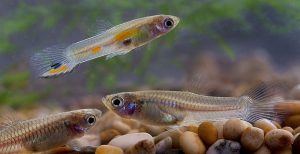It is often said that humans are social creatures. But why is this? How do other species help substantiate the need for social interaction and friendship among humans? What direct benefits result from strong ties between individuals? To grapple with these questions, Rob Heathcote, an animal behavior researcher at the University of Exeter, conducted the following experiment.
Guppies swimming in a group of three by Per Harald Olsen, source
Heathcote and his team traveled to Trinidad, an island in the Caribbean that is home to the small freshwater Trinidadian guppy. But why this place and this species you might be asking. In response, Heathcote states that, “These guppies live in environments that have tons of predators around, so basically it really sucks to be a guppy. In some places they live, you’ll be watching these shoals of guppies and a predator is attacking them every twenty or thirty seconds or so.” With the hypothesis that animals form social groups in order to reduce the risk of being preyed upon, the Trinidadian guppy was the perfect specimen. However, Heathcote sought to investigate whether the benefits of communal living derived from individual relationships (as in humans) or simply safety in numbers.
The team divided 240 female Trinidadian guppies into smaller groups of fifteen, with each group having its own pool isolated from the rest. Some fish were left alone while others were spooked with a doll version of a predator known as the pike cichlid. It was recorded that the groups formed by the guppies exposed to the faux predator were smaller on average when compared to the groups that the unprovoked fish formed. Therefore, one can conclude that the startled guppies fearing for their lives were more likely to establish stronger social connections between one another. In other words “Fear of predation drives stable and differentiated social relationships in guppies” (Heathcote et al. in Scientific Reports).
So, guppies can congregate in massive groups to blend and reduce their chances of becoming dinner. However, congregation itself attracts more and more predators. Alternatively, as seen in the experimentation, they can hide in smaller social circles of three to four individuals, a sort of family where each guppy has each other’s best interest in mind and where the guppies can effectively communicate. When drawing parallels between the Trinidadian guppy and humans, it is clear that both species form exclusive clans to ameliorate their lives. In the words of Jason G. Goldman, “Spending time with a few close friends could outweigh the benefits of blending in with the crowd, particularly in dangerous situations.”
The research results in many follow up questions. Why do some humans choose to isolate themselves from social interaction altogether? How can this study relate to international relations? What really makes humans different from more primitive species?



Leave a Reply